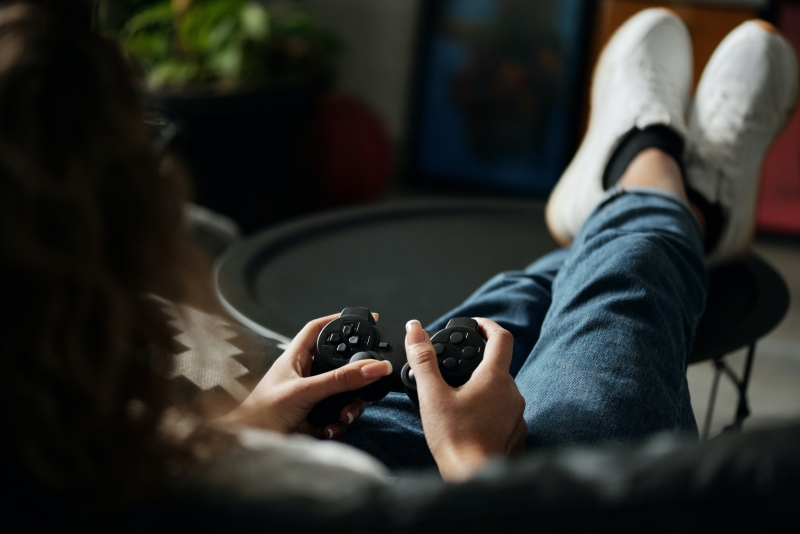My child is gaming too much, now what?
Gaming. It can provide a lot of relaxation, but at the same time it can also cause bigger problems. With ever-changing technologies and new developments, there are plenty of options to enjoy this way of relaxing. At first, it will seem harmless. After all, it is just a game. However, many underestimate the real effect of gaming. This mainly involves the long-term effects. Time passes quickly without anyone noticing. Children can be glued to a screen for too long. This can eventually lead to a game addiction and has serious health and functional consequences. As a parent, you want to know how to prevent this at all times. You can’t start this early enough. But how do you ensure that a game addiction does not arise? This blog explains everything for you.
In the following blog you will read, among other things, about the consequences of prolonged screen use in children, what symptoms you can recognize a game addiction by, what you can do to reduce gaming, what constitutes healthy screen time and how you can use the Gametimer as a tool against addiction. After reading the blog, you will be fully informed about everything surrounding this addiction in children.
The effects of long-term screen use on your child
Game addiction is not found in everyone. Children can sit behind a screen with some regularity without immediately developing an addiction to it. However, in the long run, this can become a bigger problem and you will also start to discover the negative effects. There are a large number of consequences that can result from a screen and game addiction. You can read about the most common consequences below so that you, as a parent, know what to look out for.
Many physical complaints
While gaming, a child constantly sits in the same position. Especially when the child sits behind a screen for long periods of time, this will not be beneficial to the body. Think of prolonged bending of the head due to a tablet or smartphone on the lap, for example. Just keep your head bent forward for an extended period of time. You will notice that your neck becomes stiff and starts to show pain. These pains are also known today as a “tablet neck. The shoulders and neck become overloaded and as this happens more often and for longer periods of time, the pain symptoms will also develop in your child. However, this is not all. Because children are still full of growth, this will lead to long-term fusion of the cervical vertebrae and muscle problems. Therefore, as a parent, make sure you regularly call your child on it when your child sits in the wrong position. For example, have the child hold the tablet in front of him or her and change positions.
Damage to the eyes
It has long been known that prolonged screen use is bad for the eyes. Especially in children, this can have serious consequences because the body is still developing. While gaming, children often focus on one point for long periods of time. As a result, the eyes get used to looking at a spot close by. In the long run, therefore, vision will start to deteriorate significantly and the child will have difficulty seeing in the distance. This can certainly occur quite rapidly in children due to development. Later in life, it will not only cause farsightedness to worsen, but also cause a person to suffer from myopia. Therefore, it is advisable to have your child look at a screen for only 20 consecutive minutes and then focus on another point. Even better would be for your child to go outside for a few hours after several minutes of gaming so that the eyes have to focus on other things again. Addressing your child can therefore be very important for later development.

Screen habituation
Sitting behind a screen once in a while will not directly lead to habituation. However, various substances are produced in the brain during a period of gaming. These substances cause the body to become accustomed to the stimuli that come in. Therefore, it will also become stimulating. If your child has been behind the screen for an extended period of time, the body will start to show withdrawal symptoms. This will make your child not want to stop gaming. So in the long run, this will cause your child to spend more time on this than on important things. Homework, meeting with peers and getting enough sleep will be pushed to the background. Obviously, this will not have a good effect on a child’s physical and psychological health. Therefore, as a parent, set limits for screen time and make sure your child starts paying attention to something else as well.
Social isolation
Social isolation has already been briefly touched upon in screen habituation. When a child engages in prolonged gaming, it eliminates time to build social relationships. Gaming will become an important part of life and making friendships in the real world is no longer an issue. In this case, the “online friends” the child makes in the game will be vital to completing the game. Thus, when the child is behind the screen for long periods of time, the child will begin to become completely isolated. The friends who were already in the life will also start to disappear quickly. However, the child does not pay attention to this because at that time it does not seem important to have people around him as well. The child’s development deteriorates significantly due to social isolation. Therefore, keep encouraging your child to still make friends and do something with neighborhood children.
Game addiction and violence
Too much gaming can lead to game addiction. In this case, your child is only interested in the games in his or her possession. However, many games have many elements of violence. Consider, for example, Grand Theft Auto, one of the popular games among youngsters. This exposes children to violent scenes by default. Children may then find this the most natural thing in the world and get into trouble themselves. After all, trying something out becomes harmless in the child’s eyes. For some children, this even leads to extreme consequences. If your child develops a game addiction and also starts having certain problems due to violence, it is best not to remove the games from his or her life completely. Instead, have a conversation with the child about the issue and clearly let them know the limits.
Recognize gaming addiction symptoms?
Children are on a tablet, smartphone, game console or behind a laptop throughout the day. It is the most normal thing in the world for children to own one or more devices. It can be great fun to play a game, but when this is done for an extended period of time in a day, it also leads to gaming addiction in many people. So at first it seems harmless, but a game addiction is something you always want to prevent as a parent. It is just not very easy to determine when it is actually an addiction. You can therefore keep the following symptoms in mind.
The mood worsens
While gaming, the child is often in a good mood. Once there is a game addiction, this good mood will take on extreme forms. Therefore, you soon notice it in the child when the mood deteriorates as soon as the smartphone, tablet or game console is not within reach. When the child is unable to play games, the child will do anything to get back to the screen. This is because other things in daily life are no longer going to be fun. Even things that seemed fun at first will be out of the picture from now on. If you see your child changing and exclusively taking pleasure in the game, chances are it is game addiction.
Deteriorating performance
Gaming is often a good distraction from other things in life. Therefore, children with a game addiction will also see it as an escape from problems. After all, it is an activity that always makes the child feel good. However, this does take away time from important things, such as schoolwork. Homework or learning for tests is postponed as long as possible or not done at all. Your child’s performance will start to deteriorate significantly as a result. So in this case, gaming comes at the expense of the future. As a parent, you will notice it mainly in the grades your child gets.
Less or no social contacts
Among the consequences of game addiction, it has already been noted: social isolation. Having fewer or no social contacts causes children to slowly become estranged from society and therefore more unhappy when they are not gaming.
While gaming, children then only pay attention to the particular game they are playing and nothing else. Thanks to a game addiction, your child’s social contact will also decrease significantly. Your child would rather stay indoors trying to reach the next level of the game than meet up with peers or visit family. With game addiction, children quickly fall into social isolation and loneliness will soon be just around the corner. If this is maintained for an extended period of time, it brings psychological consequences such as depression.
Trying to keep playing longer
When children are dealing with a constant urge to game, they may soon look for ways to keep gaming as long as possible. These include drinking energy drinks or coffee. Of course, this is incredibly unhealthy and bad for further development. In addition, the effect of energy drinks and coffee is only short-lived and a dip follows afterwards, which means that children will feel even more tired compared to before they drank the drink.
Problematic gaming behavior? Here’s how to handle it
It is normal for your child to spend some time behind a game console playing a particular game. However, you don’t want your child to gamble too much and for this to turn into a game addiction. So as a parent, it is pretty important to keep an eye on your child’s gaming behavior and take immediate action when it becomes problematic. Of course, it’s not exactly easy to see right away exactly when your child’s problematic gaming behavior arises. If you notice that your child is beginning to exhibit problematic behavior, there are a number of actions you can take to address it.
Have a conversation together
Parenting is all about good communication between the child and the parent. Therefore, it is also crucial to have a conversation with your child to ensure that game addiction can be prevented. Engage in conversation about the games being played, show interest and let the child explain the rules of the game. As you show interest in the game, the child may also become more aware of it. In doing so, you can also further discuss problem behavior and changes in the child. For example, make clear agreements, such as screen time. You can then also reflect on the benefits these agreements will bring. You will have more control over what your child does and can call the child to account if any agreements are broken.
Agree a screen time with the child
It has already been mentioned: agreeing on a certain screen time is important to combat game addiction. With this, problematic gaming behavior can start to decrease significantly, as your child only spends a few minutes or hours on a smartphone or other device. Here, you should adjust screen time to other activities, such as homework or performing a sport. Always discuss this as well. By comparing schedules side by side, you and your child can determine how much time is left for games. The structure that this creates will also provide a healthy balance between different daily activities.
Rewarding good behavior
When your child becomes addicted to games, you cannot expect immediate results. During the first period, many rules will be broken. After all, the problematic game behavior has gained the upper hand. You will therefore have to look at the positive aspects. For example, your child may continue to play a little longer on weekends. In that case, make sure you make it clear to your child what the consequences will be if this continues to be repeated. Especially if the child consciously does not keep to the agreements. Set appropriate punishments for this. However, with game addiction, it is also important that you start rewarding the good aspects. If your child stops on time during a certain period, you can also give him or her extra screen time on weekends. This provides the right motivation to keep the agreements.
Scheduling a rest day
With gaming addiction, the child takes almost no breaks for anything. For example, meals will be skipped, a toilet visit will be postponed until the last minute, and the child will also forget to drink. However, it is important that the child also relaxes. Therefore, be sure to discuss this and make the child aware of taking a break. You can also schedule a rest day. The child does not have to play games every day. Plan which days your child can lose himself in the game and which days the games are not touched. This leaves enough time for other activities, such as a hobby or sport. In the process, the eyes also get more rest immediately.
Stop in time
Sleep is very important for the child. When the child has a game addiction, sleep will start to decrease significantly. In this case, the child will not get enough sleep. While this can bring great benefits precisely after gaming. During gaming, the child is concentrated for a long time. Once the game is finished, the brain will continue this for a while. The different strategies are repeated, certain scenes from the game are remembered. The child will not be able to fall asleep immediately. Make sure the child stops gaming at least half an hour before bedtime. This way, the child can relax for a while and when it is time to fall asleep, this will happen quickly.
Enlisting resources against gaming addiction
As a parent, you can also make use of a wide range of tools that should make sure your child engages less in gaming. This is because the problem behavior, which with some regularity leads to a game addiction, can be prevented. In doing so, make use of parental control, for example. With parental control, you can start monitoring game behavior at all times. You can also enable different tools. For example, the Gametimer will be a good tool against game addiction. This Gametimer keeps track of exactly how much time is spent gaming so that you can discuss it with your child. There will be more information on both tools later in this blog.
How much screen time is healthy?
As a parent, you may want to ask yourself what constitutes healthy screen time with children. After all, it is normal for children to have a phone or tablet, which in fact encourages it. Therefore, you do not have to prohibit the child from being behind a screen either, but you can provide a certain amount of screen time. You can use a number of factors to determine what the healthy screen time is going to be for your child, so that a game addiction can start to be prevented early.
The age of the child
One of the most important factors in determining healthy screen time is your child’s age. Depending on age, a child may spend a number of hours at a time looking at a screen. For example, for children between the ages of 2 and 8, screen time is a maximum of one hour per day. In fact, tablets and phones can start to cause a lot of developmental damage if used for a longer period of time. Game addiction also lurks at this stage of development and can have consequences at a young age. A longer screen time can be maintained for children between the ages of 8 and 12. In this case, you can allow around two hours per day. Children older than 12 can watch a screen for up to three hours in a day. In this case, however, it is important to take regular breaks to allow the eyes to rest again. The 20-20-2 rule is a very good guideline for this.
Ensure adequate sleep
If your child spends a long time gaming, sleep will suffer. While sleep is important for development. Children who are still in elementary school have an average sleep time between 10 and 12 hours. Children of 12 years and older will generally need at least 9 hours of sleep. By maintaining this sleep, your child will grow better, relax more, and process the impressions and experiences of the day better. Thus, the less sleep a child gets, the more the retardation will become. Therefore, always include a good night’s sleep in any arrangements made. In addition, it is best to remove all screens from the room. This will eliminate distractions and prevent game addiction.

Ensuring physical contact
Communicating online has become increasingly easy because of the various devices. Think of the various social media, but also the chat functions in games, for example. Online communication also allows children to develop various friendships and get to know themselves better. Social contact is important, but the physical aspect is missing from these means of communication. Social contact is important for child development. Being in contact with other individuals causes the child to develop different skills and also to be able to hold his own better in the real world. Therefore, it is important that your child starts spending more time in these social contacts, leaving the screen behind.
Phone addiction with children
A world without smartphones can no longer be imagined. Over the years, almost everyone has owned a smartphone. So have children. Children increasingly have their own smartphone in their hands and can often already look up a lot with it. Thus, phone use among children is increasing rapidly, which means that phone addiction is also increasing at an ever faster rate. Wherever you look, a child is walking with a phone in his or her hand. Even in the late evening hours, they remain busy with this and it presents a worrying picture. It is therefore wise to become aware of this as a parent.
The importance of a smartphone for children
As a parent, you may wonder why a smartphone is so important for children. After all, it starts to look like they can’t go a moment without a phone. This is because of a substance that is produced in the brain. This is dopamine. This dopamine is produced as soon as you receive a message from a friend, see a nice picture pass by or when one of your photos or posts is liked on social media. It is therefore also called the happiness hormone and makes you feel good. Children want to hold on to this happy feeling for as long as possible. Therefore, the urge to grab the smartphone and look at it is also extra strong.
The symptoms of phone addiction
With the frequent use of a smartphone by both adults and children, it is not always easy to determine if someone has a phone addiction. After all, how can you be sure that it really is an addiction? Many children with a phone addiction exhibit virtually the same symptoms as someone who has developed a drug addiction. These include reaching for the phone when the child has nothing better to do. Children become restless and impatient when they can’t do this, so they will exhibit some kind of withdrawal symptoms.
It cannot be determined exactly when the child begins to develop a phone addiction. This is because the child will develop this addiction gradually and you as a parent are going to be virtually unaware of this. Therefore, there are a number of symptoms that should be monitored at all times. These include:
– The child uses the smartphone almost all day and develops a screen addiction in the process;
– The child becomes increasingly restless if he or she cannot use a smartphone for any reason;
– The child develops other problems with daily activities such as schoolwork and hobbies, for example;
– The child deteriorates significantly physically and mentally;
– The child derives pleasure only from using a smartphone and not from other activities;
– The child loses interest in activities he or she used to enjoy.

Tips for preventing phone addiction
If your child develops a phone addiction, it can have a major impact on development and overall performance. As a parent, you therefore want to prevent an addiction as much as possible. The tips below can help you as a parent prevent an addiction.
– Send the child outside for some fresh air. Your child will need to go outside for some fresh air with some regularity. In this case, it is important to leave the phone with you. This allows the child to focus on what is happening in the environment and not be able to use the phone for a while.
– Have the child turn in the smartphone before bedtime. This will help you prevent the child from being glued to the screen for an extended period of time and not being able to fully relax. It can also prevent the smartphone from being the first thing the child reaches for in the morning.
– Engage in conversation about phone use. Do not enter the conversation reproachfully, but try to put yourself in the child’s shoes and be open to the story the child is telling you. This will also give you a clearer picture of what the smartphone means to the child and you can gain confidence. This will also help you better convey the dangers of addiction.
– Make clear agreements about phone use. When making the agreements, consider setting a maximum screen time per day, for example. This will help prevent screen addiction.
– Teach the necessity of living without a phone. It is important to focus more on other daily activities, such as homework or dinner. In this case, the child should be able to put the phone away and have as few distractions as possible from notifications coming in.
Using parental control
As a parent, you should keep a close eye on how long the child is using a smartphone. This way, you can start in time to prevent screen addiction. You can do this by using different tools. Parental control is the right name for this. These tools should allow you to control what a child can or cannot do and how long a particular device can access the Internet. There are a large number of settings that can be set through the app. While it is a solution for screen time reduction, parental control also has a downside.
Being able to control as a parent
If you are a parent using parental control, you are the primary user of the tool. This also makes you the only one with access to user management. You have insight into what the child is doing at all times. This is done through a special app. However, not every parental control tool will have the same functionality. Therefore, you need to determine for yourself what you want to monitor and what features are necessary for this. There are some features you can start looking at:
– Viewing your child’s activities: This feature allows you to see exactly how long your child is using certain activities on the device. Thus, an activity report is created for each day, so you can get a clear overview and see where your child is going to spend a lot of time.
– Viewing your child’s location: This feature ensures that you can always find out the exact location of the device in question. Therefore, if your child often carries the phone with them, you will also know where your child is. It is also a good way to retrieve a device if it is lost.
– Manage your child’s apps: This feature allows you to manage all the apps your child wants to use. For example, you can also start blocking certain apps to make sure your child is not exposed to everything.
– Set time limits: This feature allows you to ensure maximum screen time on a particular device. This way, you can prevent your child from sitting in front of a particular screen for long periods of time. You can set a different time per day, allowing you to set a different time for weekends as well.
– Lock devices: This feature can cause children’s devices to be instantly locked. Using this feature does require your child to stop what he or she is doing. Your child will then not be able to resume working on the device until you give permission in your app. You can also attach a certain amount of time to this.
How to successfully use parental control
As you can see above, using parental control is a useful tool to gain more insight into what keeps your child busy. After all, the various devices can all be linked to keep as much of an overview as possible. However, you should also always stay in conversation with your child. For example, discuss how the child can use the devices and the Internet responsibly. In doing so, inform your child about the basic rules and what safety measures can be provided. It is also good to ask how your child thinks about certain things. This will ensure that you will also gain more insight into this.
With parental control, you will be on top of your child’s screen use. You will be able to see, monitor and limit everything. There are also rock-hard limits when it comes to turning off screens. At Gametimer, we think creating awareness in an educational way is a better solution.
Gametimer the lifesaver
Children cannot tackle prolonged screen use on their own. Therefore, it is important to solve it together. You may be familiar with the endless discussions about what was and was not the deal or how much time has already been spent behind a screen. Emotions quickly take over in such conversations, which does not always lead to a structured constructive conversation. With Gametimer you create clarity, responsibility and support. You will see that agreements are kept.


